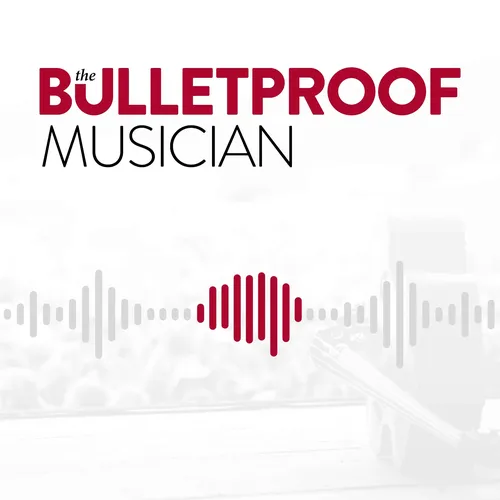
The Bulletproof Musician
Ever wonder why you can practice for hours, sound great in the practice room, and still be frustratingly hit or miss on stage? Join performance psychologist and Juilliard alumnus/faculty Noa Kageyama, and explore research-based “practice hacks” for beating anxiety, practicing more effectively, and playing up to your full abilities when it matters most.
- Update frequency
- every 7 days
- Average duration
- 17 minutes
- Episodes
- 394
- Years Active
- 2018 - 2025

Conflicted Between Two Different Choices? Here’s a “Random” Way to Accelerate the Decision-Making Process.
Ever get paralyzed and indecisive when faced with a choice between two things that are either similar, or have competing pros and cons? Research suggests that a "random" decision aid can help acceler…

Uri Vardi: On the Way Unconscious Habits Shape Our Playing, and How Feldenkrais Can Help Us Unlock More of Our Potential
Cellist and Feldenkrais practitioner Uri Vardi explains what Feldenkrais is (and isn't) and shares some examples of how this body awareness modality can help musicians play more efficiently and effec…

Self-Monitoring, and How “Happy Face” May Have Been a More Potent Practice Strategy than I Realized…
A 2017 study found that "self-monitoring" was a significant predictor of whether athletes were competing at an elite, less-elite, or recreational level. So what is self-monitoring exactly, and how do…

Three Different Types of Practice Strategies - Which One Works Best?
Research suggests that not all practice strategies are equally effective. So between blocked, random, and win-shift/lose-stay practice, which one is best? And just what do these strategies look like …

A Way to Amplify (or Weaken) the Effect of Self-Talk on Performance
A recent study suggests that there is a simple self-talk hack that could make it even more effective in enhancing performance.
A Way to Amplify (or Weaken) the Effect of Self-Talk on Performance
More…

Menahem Pressler: On Following Your Heart
In this interview originally recorded over Skype and telephone back in 2012, renowned pianist Menahem Pressler speaks about the importance of finding your own voice, and shares many profound insights…

A Goal-Setting Tweak That Could Be the Difference Between an OK Performance and a Great Performance?
We often hear that positive thinking, and envisioning the future we want is an important step in getting there - but research suggests that the best performers include another key ingredient that is …

How Exaggerating Technical Errors Could Improve Your Technique
Struggling to nail a tricky shift or hit a difficult high note? Believe it or not, research suggests that instead of trying to do everything right, it might be worth trying to do everything wrong fir…

Should Phones and Laptops Be Banned in the Classroom? Or Is This Just Much Ado about Nothing?
Is banning phones and laptops in class a good idea - or totally unnecessary? A new study provides answers, but it's a little more nuanced than you might think.

Margo Drakos: On Creating a Safety Net and Taking a Chance on Yourself
Cellist-turned-entrepreneur Margo Drakos shares some of the key strategies that have been instrumental to her success both in music (Oregon, San Diego, Seattle, Pittsburgh symphonies & American Strin…

Why Learning the Wrong Way to Play Could Enhance Performance (and Confidence Too)
A study suggests that we can learn more effectively and build more confidence by learning more about the wrong ways to perform a skill, instead of only learning the correct way to execute a skill.

The Potential Upside of Having a "Rival"
Rivalries are often thought of as being really competitive, and sometimes unhealthy, but are there situations in which they could be a good thing?
The Potential Upside of Having a "Rival"
More from T…

How to Keep Your Cool Backstage Before Auditions and Performances
When you have too much time to wait backstage, it can be easy for your thoughts and emotions to spiral out to the bad place. Learn the specific strategies that athletes use to regulate their emotions…

8 Strategies for Breaking Out of a Performance Slump
Ever find yourself stuck in a performance "slump"? Where you struggle through a string of subpar auditions/performances, and can't figure out how to get back on track? Here are 8 strategies that can …

Catherine Cho: On Developing Great Rhythm (and Why Old-School Metronomes Are the Way to Go)
Have you ever felt that the music was "stuck"? Or wondered why your metronome practice wasn't working? Learn how to get unstuck and cultivate a stronger sense of rhythm in this chat with violinist Ca…

The Performance Post-Mortem: A Review Process to Bounce Back Better and Faster
Feeling a little demoralized after a sub-par performance? Here's a research-based post-performance reflection process developed at Florida State University to help you bounce back better, faster, and…

A Visualization Hack to Get More Out of Your Mental Practice
It's common to vary one's speed/tempo when you're doing physical practice. But is there any benefit in doing this when engaged in mental practice?

A Mental Tweak to Reduce the Gap Between Your Best Playing and What Happens Under Pressure
Research suggests that a new mental adjustment and shift in how we view the stakes in stressful performance situations could help us avoid choking under pressure.

David Kim: On Letting Go and Being Yourself
Philadelphia Orchestra concertmaster David Kim shares insights on his most effective practice techniques, biggest failures (and successes), and more.
David Kim: On Letting Go and Being Yourself
More …

A Scientific Rationale for Keeping Photos of Friends and Family in Your Case
Are people who have pictures of family and friends in their case on to something? A study suggets that simply imagining our partner can help us reduce stress as much as having them physically present…